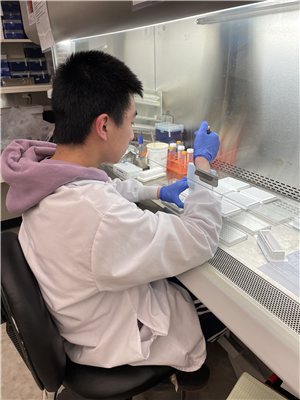Lance Xu
CB West’s Lance Xu was one of two seniors from the Central Bucks School District who were recognized among the 300 teen scientists selected in the Regeneron Science Talent Search 2023, the nation’s oldest and most prestigious science and math competition for high school seniors.
Regeneron Science Talent Search 2023, the nation’s oldest and most prestigious science and math competition for high school seniors.
Lance, a senior at CB West, examined "The Framing Effect,’’ a study of the cognitive bias in which people’s decisions are swayed by the context surrounding a question, problem or event. He received a $2,000 cash prize in recognition, as did CB West.
Now in its 101st year, the program sponsored by Society for Science attracted 1,949 applications from 627 high schools across 48 states, Washington, D.C., Puerto Rico and four other countries. Scholars were chosen based on their outstanding research, leadership skills, community involvement, commitment to academics, creativity in asking scientific questions and exceptional promise as STEM leaders, demonstrated by the submission of their original, independent research projects, essays and recommendations.
“The enthusiasm and quality of projects from this year’s participants were just outstanding,’’ said Maya Ajmera, President and CEO, Society for Science and Publisher, Science News. “Each year, I am tremendously impressed by the ingenuity that the students bring to the competition. Their hard work, creativity and perseverance should be applauded.”
Expanding Known Influencers of Framing
 Xu’s project entailed expanding known influencers of framing – such as gender – to explore and compare a wider variety of demographics, including age and political affiliation.
Xu’s project entailed expanding known influencers of framing – such as gender – to explore and compare a wider variety of demographics, including age and political affiliation.
“Framing is prevalent in everyday life, from the news to advertisements to medicine,” he says. “Some organizations or individuals may use framing in a beneficial way, while some may use framing in a more manipulative way. For example, news stations may use framing to skew opinions about a topic in order to fit their own agenda.
“Research into the effects of framing is paramount in order to educate the public about the potential effects of framing, especially on advertisements for medical products or treatments taking advantage of specific demographics.”
Focusing on framing as it pertained to medical diagnosis and treatment, Xu found that adults in an older age group, those that identified with a political party (Democrats/Republicans) and females exhibited more prominent framing effects in medical contexts than those who are younger, politically Independent and male.
This could be important to the medical field because doctors always need to present patients with treatment methods,” says Xu, who also participates in the PA Biotechnology Internship Program, where he is currently working on finding novel therapeutic cures for liver cancer in the Baruch S. Blumberg Institute labs. Xu plans to study biomedical engineering in college and aspires to be a physician-scientist someday. “Consider the age example specifically – as you get older, you are more risk averse. So, 95% survivability presents it as a lower risk. But say it as a five percent death rate, and it can sound high risk, particularly to that demographic. So, doctors – all healthcare workers really – need to be more considerate of how they phrase things.”

